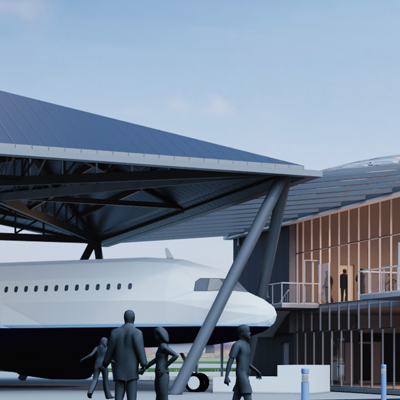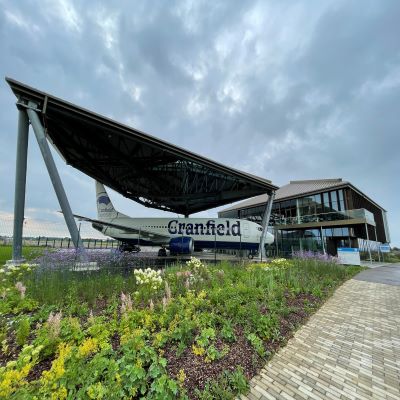
Turnaround of a TUI flight at Exeter Airport
Image credit: TUI aircraft turnaround at Exeter Airport
A groundbreaking collaboration between Regional & City Airports (RCA),
global travel company TUI and Cranfield University is investigating how to
reduce the environmental impact of aircraft turnarounds at airports.
The study will focus on how to decarbonise ground operations and reduce
environmental impact by analysing TUI aircraft turnarounds at RCA-owned
Exeter Airport in Devon in the UK.
Examining aircraft turnarounds in detail
Experts from Cranfield University’s Centre for Air Transport Management,
which has a long-standing focus on aviation and the environment, are using
TUI data, airport vehicle usage data and other information sources to create
an ‘emissions inventory’ of ground operations.
By examining the different elements of the turnaround in detail, the study
will address a gap in current research and identify where tangible emissions
savings can be made in the short term, and where there may need to be bigger
changes in the future, including new technology.
With an estimated 85 million global air traffic movements in 2022 , the
project’s findings could have important ramifications for the global
aviation industry.
Academia and industry collaboration
Professor Anna Smallwood, Head of the Centre for Air Transport Management,
Cranfield University: “Addressing the future challenges faced by the
aviation industry will require high degrees of collaboration to develop
integrated solutions. This is an excellent example of industry and academia
working together to understand the real issues and find opportunities to
move forward in a viable and sustainable way.”
Dr Thomas Budd, Senior Lecturer and DARTeC Fellow in Airport Planning and
Management at Cranfield University said: “This is an exciting opportunity
for us examine a key part of the aviation ecosystem and find ways to reduce
turnaround emissions. Understanding more about the emissions created will
give us a clear view on what mitigating measures will make the most
significant impact – and we can then use this as a stepping stone to further
decarbonisation of airport operations.”
Andrew Bell, Chief Executive of leading UK regional airport operator
Regional & City Airports, said: “This project is the latest in our
ongoing collaboration with Cranfield University to help drive innovation
across our industry, and is a vital part of RCA’s commitment to make our own
airport operations net zero by 2040. We’re excited to be involved and look
forward to seeing how the findings could be put into practice across our
airport estate.”
Dawn Wilson, Chief Operation Officer, TUI Airline said: “This important
collaboration is another step in our net zero journey and commitment to
reducing the environmental footprint of travel. TUI Airline is already among
the most carbon-efficient in the world having continuously invested in new
aircraft, and our goal is to drive further emissions out of the system
through our work with RCA and Cranfield University at Exeter Airport.”
Over the coming months, Exeter Airport will act as a living laboratory for
Cranfield’s experts to look at aircraft turnarounds in forensic detail.
Working with the airport’s ground handling staff and using TUI’s passenger
flights, they will track every aspect of the ground handling process to
measure emissions impacts.
The next step will examine potential mitigations, including the use of
electric and alternatively fuelled airside assets, as well as other
operational measures that can be adopted by the airport.
The study is expected to report back next year.


